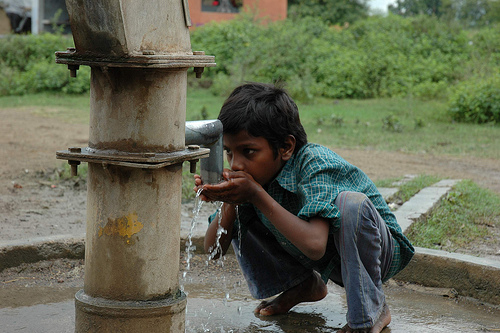The recent UN General Assembly Resolution on declaring water and sanitation as human right is or can be a powerful impetus to securing universal access to water and sanitation for people everywhere. This is the most recent in a string of initiatives to advance the provision of these essential services. Beginning with the UN Decade of Water in the eighties, then the declaration of the Millennium Development Goals, and later the adoption of General Statement 15 by the Economic and Social Council of the United Nations in 2002 the recognition of the fundamental importance of water (and more recently sanitation) to life, health and well being has been accepted at the international level. In India, while there is no specific mention of the right to water in the Constitution, the Supreme Court in its judgement(s)has upheld this as part of the right to life. Some organizations are working to make this a fundamental right, to remove any ambiguity.

Boy drinking water from handpump in Guna, Madhya Pradesh - Handpumps and wells are still one of the major source of drinking water in India.
Photo credits: Anil Gulati
However as in most things, implementation lags intention by a very long way. As always there are several reasons for this situation. Political will, or lack of it, is cited as one such. In India political will is often driven by pressure and electoral compulsions and one reason why this is not strong enough to advance the cause of universal access to water and sanitation is that while pubic pressure is strong, it may not be overwhelming. Certainly this is true for the provision of safe sanitation which, for a variety of reasons, is not regarded in as compelling a manner as water.Of course there are a number of issues where lack of clarity contributes to delay andprevarication such as lack of convergent thinking about the primacy of water for human consumption in the welter of conflicting demands for a scarce resource, confusion about the choice of appropriate technologies, lack of clear and enforceable accountabilities, disagreement about the interpretation of water as a right between free provision or as a paid service and others. But all these multiply when the political will is not strong enough.
In India in the twenty first century perhaps the question to ask ourselves, particularly those in a position to read this piece, is whether political will is a distant concept, something in the exclusive domain of governments and politicians or whether as individuals and collectives we are doing enough, through our behaviours and actions to own, generate and sustain that political will.
/articles/un-general-assemblys-resolution-water-and-sanitation-human-right